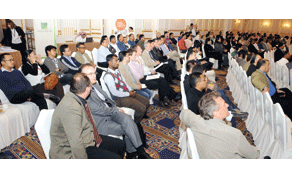The Anaerobic & Aerobic Digestion plant of the Domestic Solid Waste Management Centre at Mesaieed has produced approximately 1,000 tonnes of Grade A compost until date.

A section of the audience at the seminar
“It is the world’s largest composting plant and the first integrated solid waste management complex in the Middle East,” a Qatar Green Building Council seminar was told on Tuesday.
The event on ‘Organic Waste Management in Qatar: problems and solutions,’ was organised by QGBC’s Solid Waste Interest Group.
The plant, which utilises Keppel Seghers proprietary waste-to-energy and waste management solutions, has been commissioned for Qatar’s Ministry of Municipal Affairs and Agriculture in 2010.
Work on the complex, located on a 2km x 1.5km (714.3 acres) plot, started in November 2006. It is being run on an operation and maintenance contract of 20 years.
“The plant comprises of three sections; pre-treatment, treatment and post-treatment,” explained section head Michael Allan, in a presentation on ‘Processing Green and Organic Waste at the Domestic Solid Waste Management Centre, Mesaieed.’
The pre-treatment has two streams; green waste (yard, biogenous, market, and catering/kitchen waste) and Municipal Solid Waste (MSW). The treatment comprises five modules of three anaerobic digesters each.
While three digesters of Module A are reserved for green waste processing, the balance (Modules B to E) uses MSW. Post-treatment includes maturation hall and area for digested compost.
The green waste is shredded and sieved before small pieces are fed into the digester for a 14-day process. The big pieces are incinerated. When extraction and maturation are over in 28 days, Grade A compost is ready for collection.
The MSW will be sieved through the Dano Drum. Waste less than 50mm will be sent to Anaerobic & Aerobic Digestion and Composting plant through feeding conveyor system and will be fed into the digesters automatically based on the daily operation requirement.
The composting time for MSW is also the same and the end product is Grade B compost. At full capacity, the plant will be able to treat 750 tonnes of green waste and MSW daily.
“The plant process produces biogas that provides up to 6MW electricity and heating for digestion process,” Allan explained.
The green waste modules are in operation since November 2009, with full-fledged operation commencing in October 2010. Currently, average feeding is at 36 tonnes daily.
Once in full operation, the plant could produce daily 52 tonnes of Grade A compost, 377 tonnes of Grade B compost, liquid fertiliser (51 tonnes of Grade A and 204 tonnes of Grade B) and 129 tonnes of biogas.
Compost and liquid fertiliser are used mainly as a nutrition additive for enriching soil quality for purposes such as park maintenance, landscaping, organic gardening and agriculture use.
“Compost and liquid fertilisers reduce dependency on industrial-type fertilisers and meet all organic and sanitary requirements for plant fertilising,” Allan added.
Australian company Innovative Total Solutions director Daniel Mitroussidis who gave a presentation on BiobiN waste management system, pointed out that Qatar’s daily per capita waste generation rate of 1.6kg is one of the world’s highest.
BG2 Global Qatar’s technical projects director Greg Hills spoke about municipal organic waste management systems.
In a presentation on the Zero Waste Act and organic waste, Lebanese company Contra International’s general manager Bassel Baaklini said that a major portion of the 7,156 tonnes of solid waste generated daily in Qatar goes to landfill.
“Qatar aims to increase its recycling capacity from the current 8% to 38% by 2016,” he added.

